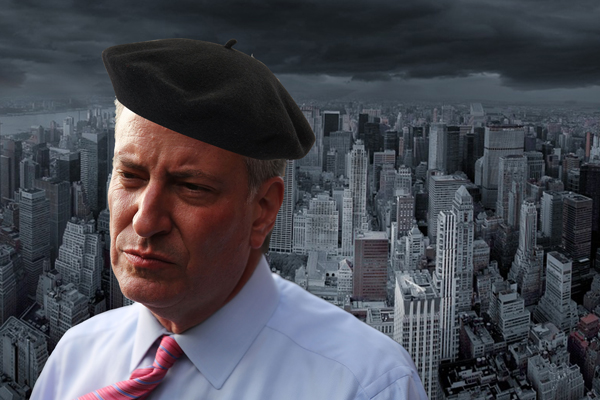Following a barrage of attacks on his ties to the city’s real estate industry, Mayor Bill de Blasio fired back with a surprising statement. The mayor said, if given the chance, he’d deflate private property rights.
“If I had my druthers, the city government would determine every single plot of land, how development would proceed,” he told New York Magazine. “And there would be very stringent requirements around income levels and rents. That’s a world I’d love to see.”
In a city that, in many ways, revolves around real estate, that’s a pretty staggering proposition — even coming from a self-professed progressive Democrat. The mayor himself recognized the impossibility of handing full control of every property over to the city government, noting in a New York Magazine interview that “hundreds of years of history that have elevated property rights and wealth” stood in the way. Still, the statement perhaps shows the mayor’s desire to create distance between himself and the real estate industry — to redirect a narrative that’s taken hold in the lead-up to the September primary.
“He didn’t stop at Bernie Sanders, he went straight to Chairman Mao,” one real estate executive told The Real Deal on Friday, referring to the mayor’s far left-leaning statement.
Another developer said knowing that the mayor feels this way might give industry executives pause when negotiating projects with the city.
“I think that he’s saying things that are politically expedient but also which he truly believes,” the developer said. “I think critiques of him being too close to the real estate industry are crazy.”
A Manhattan-based developer, who requested anonymity due to the sensitivity of the subject, told TRD that de Blasio’s comments were designed to push back against accusations that he’s too cozy with real estate heavyweights.
“I think it was just to appease people who thought he’d been influenced too much by developers,” he said. “It’s not something that’s practical or would ever happen.”
When asked to comment on reactions to the magazine’s interview, a spokesperson for the mayor would only say that de Blasio’s “values and record speak for themselves.”
“He is a firm believer—as is the entire administration—in securing the maximum benefit for the public in every aspect of our housing strategy,” said Melissa Grace, a spokesperson for the mayor.
David Birdsell, dean of the Baruch College School of Public Affairs, said de Blasio sees himself as a leader of the progressive left and therefore needs to at least put “rhetorical” distance between himself and big business. He noted that the mayor doesn’t suggest that there’s any way to actually challenge the country’s regard for private property rights; he’s merely stating that his “sympathies are tried-and-true socialist.” What will matter most, Birdsell said, is the mayor’s actual relationship with the industry.
“I very much doubt that language of this sort will worry the real estate industry,” he said. “They know they’re a political bogey, and like the left wing of the Democratic Party, though for different reasons, they’ll care more about what the mayor does than what he says.”
Over the past two years, the mayor’s ties to the real estate industry have been at the center of various probes. But state and federal officials announced in March that de Blasio wouldn’t face criminal charges in relation to fundraising activities tied to his now defunct Campaign for One New York. The investigations had focused on whether de Blasio solicited donations from developers and others who had business before the city in exchange for political favors. One developer was Jona Rechnitz, who allegedly asked the mayor to give a retired police officer a high-level position in his administration as a “personal favor.”
Though the investigations are closed, they’ve taken on a new life for the mayor’s opponents. During a mayoral debate held in August, Democratic challenger Sal Albanese cited the investigations and said that the mayor “turned the city over to big developers.” He also said the Real Estate Board of New York “loves” the mayor.
REBNY declined to comment on the mayor’s statement about private property rights.
Republican opponent Bo Dietl tweeted about the mayor’s comments on private property on Thursday, indicating that they were better suited to a communist country.
DeBlasio doesn’t like private property rights. Says government should control. GO BACK TO HAVANA BIG BIRD!
— Bo Dietl (@BoDietl) September 7, 2017
Another real estate executive said that the mayor’s statements shouldn’t be taken too seriously. He said the comments were just the mayor’s best Bernie Sanders impression, a way to up his liberal cred leading up to the election. He noted that the city has turned to private developers to address the city’s affordable housing crisis. The mayor’s Mandatory Inclusionary Housing program, the linchpin of his affordable housing agenda, for example, relies heavily on a buy-in from the city’s developers.
“His administration has advocated using density to solve affordable housing woes and building our way out of the crisis,” he said. “That’s a market-based solution.”
